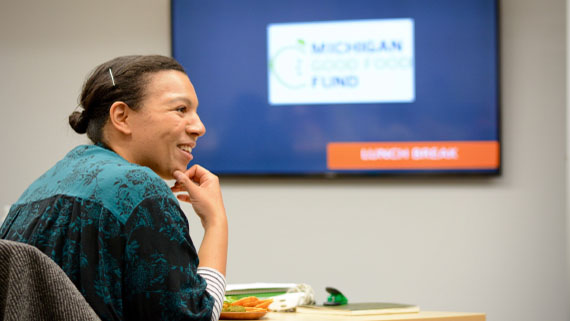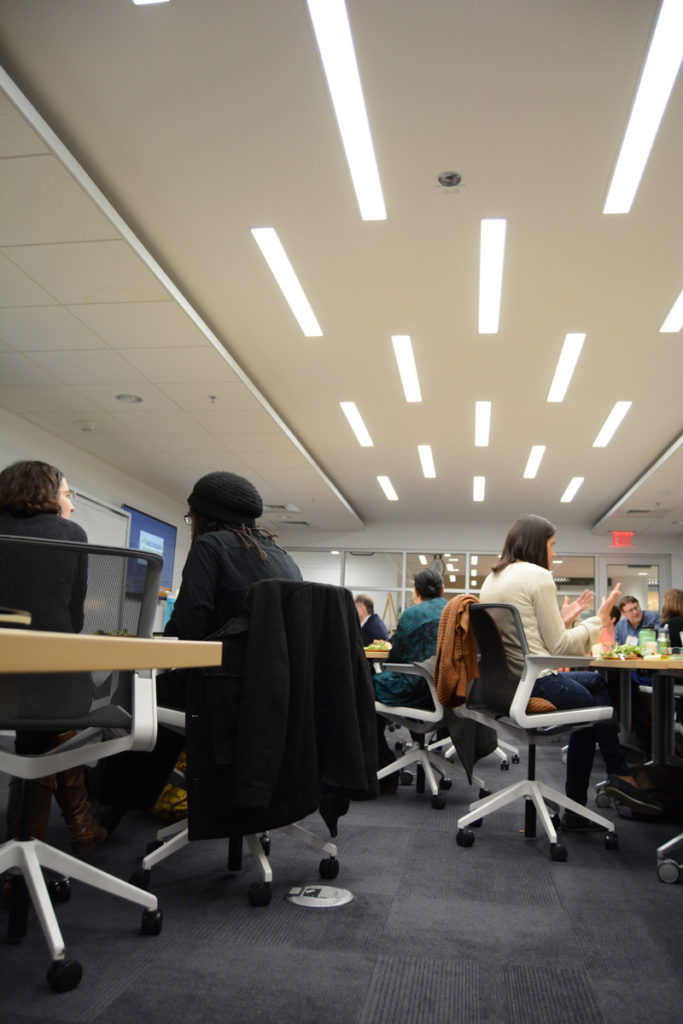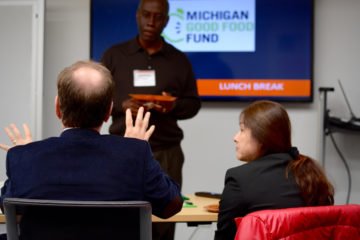Bodega Boot Camp

Bodega Bootcamp teaches business skills to Michigan’s startup grocers.
By Amy Haimerl for Michigan Good Food Fund
Spring 2016
Inside a small brick building in the Corktown neighborhood of Detroit, a plan is hatching—a plan that will bring the building full circle. Kiki Louya and Rohani Foulkes hope to turn the former Bagley Trumbull Market, which was more liquor store than market, into a year-round farmers market and café offering fresh, healthy, and locally grown food.
“For us it’s about coming full circle,” says Foulkes. “When you look at our vocational background, it started in food—food justice, food education—and now we’re bringing it back to the growth of food and growth of honest food. We want a retail outlet that contributes to that.”
“What makes us unique is that it really is about supporting Michigan agriculture and the farmers,” adds Louya. “We will source 100 percent local, meaning Michigan made. And we also give a higher profit margin back to the farmer—triple the national average.” 
The pair met earlier this year as they were individually working on a plan for a market and café. As they crisscrossed the city and state talking to farmers and other retailers about their ideas, they kept hearing about another woman doing the same thing. Eventually, they decided to meet.
“We were both doing the work without realizing it,” says Louya with a laugh. “We were overlapping to the point where people thought we were the same person.” When they discovered they both had backgrounds in food and nonprofits and were committed to a sustainable and just food system, they decided to team up on The Farmer’s Hand. But while they both had extensive food industry experience, they lacked retail savvy, so it was fortuitous when they heard about Bodega Bootcamp, a one-day crash course provided by the Michigan Good Food Fund on how to start a healthy food grocery store. The Fund had heard from a number of startup grocers such as The Farmer’s Hand and wanted to help them accelerate their business planning because the enterprise fits in with the Fund’s work providing financing and business assistance to healthy food production, distribution, processing, and retail projects that address food access issues in underserved communities in Michigan.
To do that, the Fund brought in James Johnson-Piett and his community development firm, Urbane Development, from New York City to host a Bodega Bootcamp (http://urbane-dev.com/ projects/bodega-bootcamp/) for five startup grocers: The Farmer’s Hand, Chene Street Grocers, and Detroit People’s Food Co-op in Detroit, The Local Grocer in Flint, and a new store in Jackson being supported by Bridgepoint Development.
“Since the Fund launched, we’ve received a number of inquiries from startup grocery projects committed to putting healthy food at the center of their stores,” said Oran Hesterman, president and CEO of Fair Food Network, a core partner of the Michigan Good Food Fund. “Through the Bodega Bootcamp, we were able to network these groups and build their business acumen so they can translate their ideas into success in the marketplace.”
Johnson-Piett has offered his branded Bodega Bootcamps since 2007, and in the beginning the lessons in business development were needed but not widely in demand. However, in the past two years, that has changed, Johnson-Piett says, as more entrepreneurs see food retail as a way to marry social mission with business opportunity. In Detroit, for example, nearly $200 million in grocery spending leaked out of the city to the surrounding suburbs in 2013, according to Urbane’s recent report “An Analysis of the Detroit Food Market.” Entrepreneurs such as those in the bootcamp see a chance to harness that spending and keep food dollars in the local economy while increasing healthy food access.
But first Johnson-Piett helps them match their zeal with a foundation in actually running a business. The bootcamp takes entrepreneurs through the nitty gritty of running a store, from reading income statements to predicting expenses to properly pricing and determining profit margins.
“When I talk to nascent-stage entrepreneurs, they have this grand vision of what they want to do,” Johnson-Piett says. “But it’s not about whether it’s viable in the marketplace. The question is whether or not your vision has been defined by the marketplace. Are you adding value to the marketplace? What problem are you trying to solve? Usually they say, “community access and health.” And those are great problems to solve, but how does your business solve that problem and do it more effectively than other businesses in the space?”
That is a question Malik Yakini is taking very seriously. As the executive director of the Detroit Black Community Food Security Network, he is working with the community to open the Detroit People’s Food Co-op in Detroit’s North End neighborhood to provide an outpost of healthy food in an otherwise underserved area of the city.
“This community owned and community empowered venture envisions the co-op being more than a grocery store but a community gathering space with a public theater and garden that primarily serves the residents in Detroit’s North End,” Yakini wrote when fundraising for the project kicked off in 2014.
 Such expansive thinking tied with alternative funding and ownership models is something Johnson-Piett finds interesting and exciting about Detroit.
Such expansive thinking tied with alternative funding and ownership models is something Johnson-Piett finds interesting and exciting about Detroit.
“Food is a massive system that touches every single person,” he says. “But we don’t think about the shell behind it. In Detroit there is a food district like few other places. It has one of the best infrastructures for support in this space. Between the Detroit Economic Growth Corporation’s Green Grocer program, FoodLab Detroit, Build Institute, Detroit Food Academy, Michigan Good Food Fund, and more, there are so many groups that can tackle different parts of this.”
Foulkes and Louya are counting on that as they count down the months to the fall opening of The Farmer’s Hand. The Bootcamp helped them develop their benchmarks for financial success, see where they will be able to connect with other resources, and really understand their value proposition to the consumer. But most importantly, they liked being in a room with other entrepreneurs and understanding they were all facing the same questions and were not alone.
“Something that came out of the bootcamp was the fact that there was a need for [the training] to exist,” says Foulkes. “We all have innovative models of the market experience, and I think that speaks to the nature of shopping and how we think about our food and supporting the folks who grow our food.”
Amy Haimerl is the author of the memoir, “Detroit Hustle,” and professor of journalism at Michigan State University. She reports on entrepreneurship and urban policy for Fortune, Reuters, and the New York Times. She lives in Detroit with her husband, two dogs, and stray cat, Jack.
